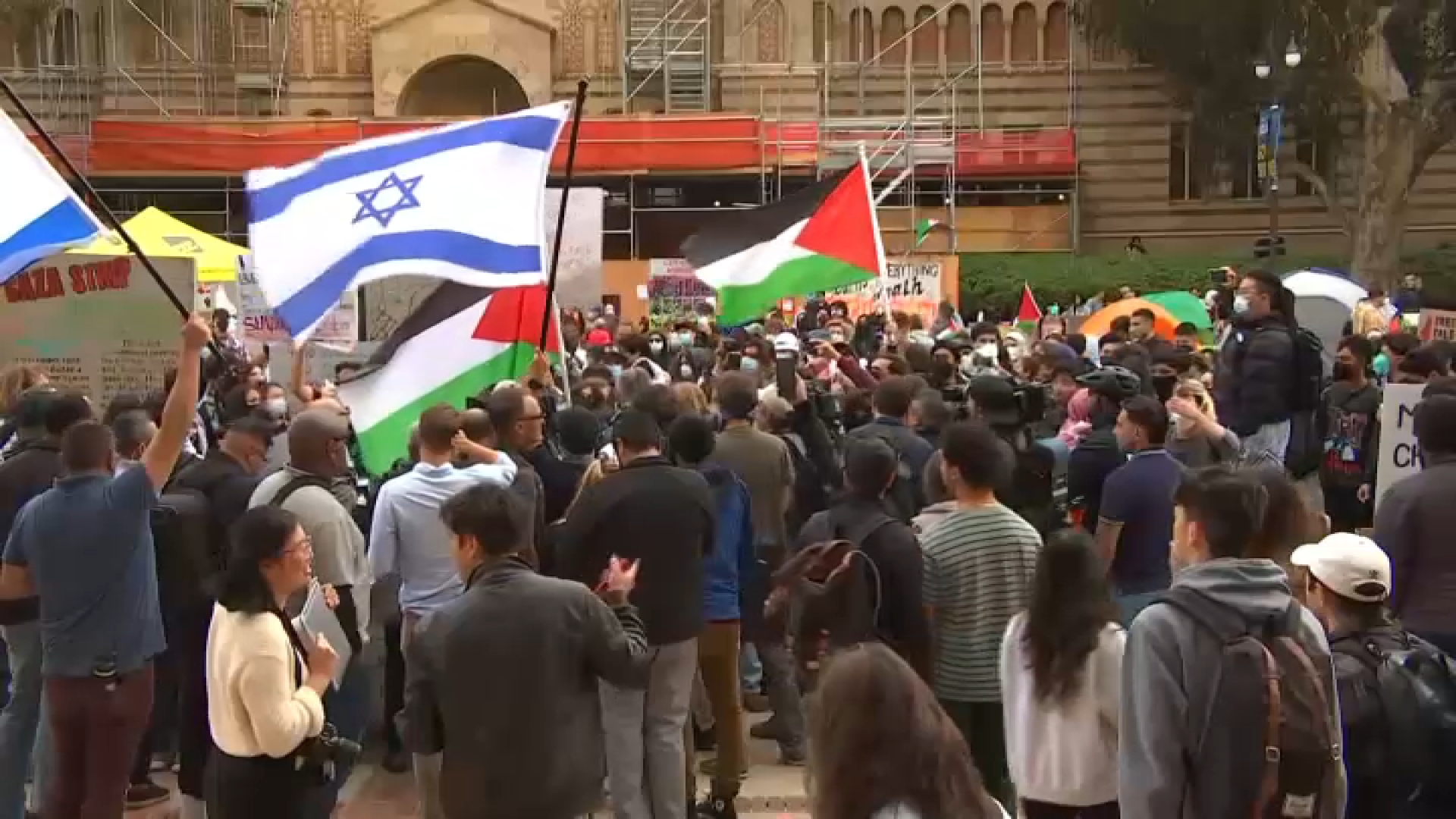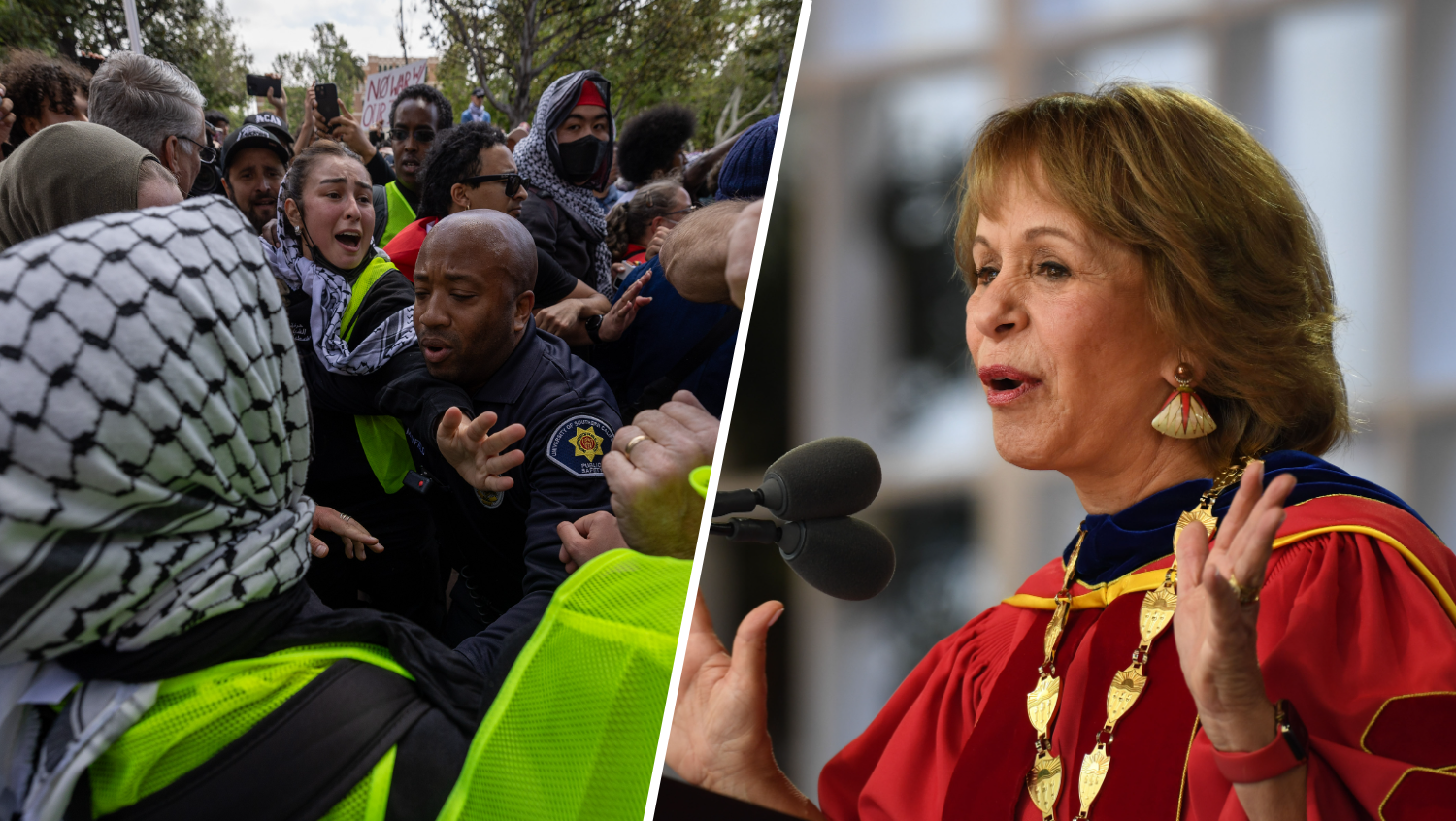The pro-Palestinian protest and encampment at UCLA continued to grow Friday in its second day as pro-Israeli students and leaders say the demonstration has caused fear among Israeli and Jewish students.
Outside of Royce Hall, the demonstration has grown to a couple hundred people who have set up tents, signs and eating areas. The demonstrations have remained mostly peaceful, though there were scuffles on campus Thursday night.
“We are here as a very peaceful, loving, non-violent environment that is asking for human rights and for people to stop being murdered,” said Marie Salem, a UCLA graduate student and demonstrator.
Get top local stories in Southern California delivered to you every morning. >Sign up for NBC LA's News Headlines newsletter.
The protesters have issued a number of demands to UCLA, including divesting and disclosing any financial connections between the university and the government of Israel. They are also asking for the university to issue an official call for a ceasefire in Israel’s war with Hamas and to not allow police on campus to remove the encampment.
“Our students deserve to know where their tuition money is going. They deserve to know where their endowment is going,” Salem said. “End the silence. UCLA has yet to make a statement for a ceasefire.”
Meanwhile, NBC4 spoke one-on-one with Israel Bachar, Israel’s Consul General about the ongoing protests at UCLA, USC and a growing number of universities across the nation.
“I think we need to acknowledge that the American democracy is under attack and anarchy is not democracy and hate speech is not a free speech,” Bachar said. “This historic moment in American universities — you need to stand up and fight and explain to everybody that these voices and this rhetoric that we are experiencing, it's untrue.”
One UCLA graduate and current pro-Israeli activist, Celine Rouben, stopped by the demonstration.
“I came down here to show solidarity to my Jewish brothers and sisters on campus and who were too afraid to come out of their dorms yesterday. And I'm here to show them that they should not be afraid,” Rouben said. “ I don't support the violence of either side, but they're calling for the genocide of Jews when they're screaming, you know, ‘From the river to the sea, free Palestine.’”
UCLA released a statement to NBC4 Friday afternoon that read in part:
“UCLA’s approach to the encampment is guided by several equally important principles: the need to support the safety and wellbeing of Bruins, the need to support the free expression rights of our community, and the need to minimize disruption to our teaching and learning mission. These same long-standing principles have allowed UCLA to uphold a history of peaceful protest.
“It’s also important to note that we are following University of California systemwide policy guidance, which directs us not to request law enforcement involvement preemptively, and only if absolutely necessary to protect the physical safety of our campus community.”
By 5 p.m., two dozen pro-Israeli protestors arrived outside the encampment, blaring music and holding Israeli flags.
Campus patrol stood in between them and the pro-Palestinian protestors in the encampment as everything remained peaceful.
Those in the encampment say there is no end date — only saying they refuse to leave until UCLA meets their demands.
“I’m always concerned that, you know, the university sort of caves to values which are beneath it. I feel like in Columbia, that definitely happened. I feel like USC could’ve done a better job,” said Michael Chwe, a UCLA political science professor who, along with other UCLA faculty, came to support the encampment. “All of us and everything we do, we should embody the values of the university and the values of the university, I think we can all agree on, respect, learning, research, and it should be an environment where you can all feel good about being here and to learn from each other.”



